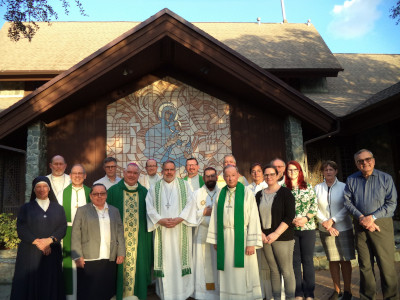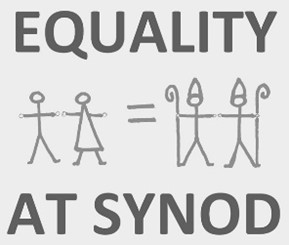"Exclusion of women from ordination cannot be justified biblically".We are Church Germany Press Release on the ordination of presbyters in Cologne on 16 June 2023
On this year's Solemnity of the Sacred Heart of Jesus, Friday 16 June 2023, Archbishop Rainer Maria Cardinal Woelki of Cologne will ordain six deacons as presbyters in Cologne Cathedral. This demonstrates once again, without any biblical basis, that women are being denied ordination to the presbyterate solely for the sake of clerical male power.
The Church People's Movement We Are Church recalls the ordination of seven women presbyters 21 years ago on 29 June 2002, the feast of the holy apostles Peter and Paul, a date on which many ordinations usually take place.
While Pope John XXIII (1958-1963) in his encyclicals "Mater et magistra" (15 May 1961) and "Pacem in terris" (11 April 1963) spoke out for the equal human rights also of women in all spheres, Pope John Paul II in his letter "Ordinatio Sacerdotalis" (22 May 1994) attempted to establish the prohibition of women's ordination for all time and thus gave his successors a heavy burden.
We are Church welcomes the fact that despite this ban, the discussion about the renewal of the presbyterial ministry and its opening to women has not ceased but has intensified and has now also been underpinned with good theological arguments at the Synodal Path in Germany. In the meantime, more and more bishops in Germany and worldwide no longer consider the ordination of women to be impossible.
For it is and remains a scandal that the Roman Catholic Church still denies women ordination for leadership ministry. This fundamental degradation of women, which cannot be justified biblically and theologically, poses the danger that the Church will very soon no longer be able to fulfil its pastoral mission.
Preview of the year 2040: reality or still a vision?
Compulsory celibacy for secular clergy has been abolished. Four of the six deacons ordained in 2023 are married - two of them long-time happy fathers. In an interview, the new pastor of Unkel emphasises that his wife is already a deacon and is currently preparing for ordination to the presbyterium. They write their sermons together, which are very appealing to people.
The shortage of presbyters is a thing of the past and the understanding of ministry has changed. Now competent laymen and laywomen have taken over parish leadership and administration. Presbyters, deacons and deaconesses can finally concentrate on their core tasks: Pastoral care, church services and life-accompanying chapels. This has made it possible to guarantee sufficient "supply" everywhere again; long journeys to Mass are a thing of the past.
The chaos caused by the areas of mission decreed from above with a minimal supply of presbyters (one presbyter for nine and more parishes, which overtaxed everyone) is, thank God, a thing of the past. Overall, the role of the laity has been enhanced, as the Second Vatican Council (1962-65) wanted. They have more say at all levels, which has led to an upswing in congregational life. Joint communion celebrations with the Protestant Church are still not officially "allowed", but are celebrated almost everywhere. Divorced, remarried or homosexual people are no longer excluded from communion.
Decisive for the smashing of the argument that Jesus only called men were the continuous protests of many Christians and also of We are Church and Maria 2.0. Their argument: The demand for human and women's rights, which Pope John XXIII started with, is already manifested in the Bible (Genesis 1, 27): God created man in his image... as male and female he created them!
We are Church press contact:
Georg Mollberg (We are Church in the Archdiocese of Cologne).
Tel: 02224 3960, e-mail:
Christian Weisner (We are Church national team)
Tel: 0172 5184082, e-mail:







